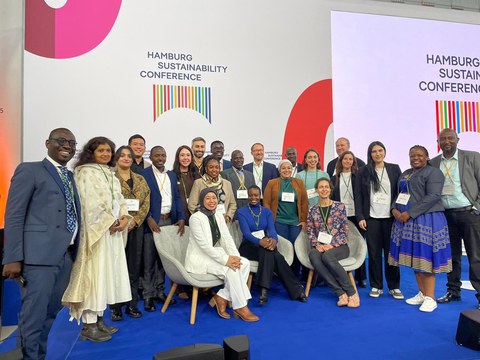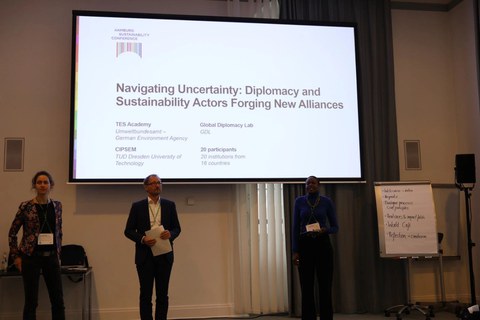Oct 11, 2024
TU Dresden contributed to first Hamburg Sustainability Conference

TUD/CIPSEM alumni and representatives with partners from UNU-FLORES, UBA and GDL - the international team behind the session on "Navigating Uncertainty" at the HSC2024.
The Hamburg Sustainability Conference (HSC2024) brought together over 1,600 experts from across the globe, creating a new platform for science, policy, and practice interactions in the realm of sustainability. Representatives from United Nations University-FLORES and Technische Universität Dresden (TU Dresden) played a prominent role in the event, contributing also on behalf of the Global Water and Climate Adaptation Centre – ABCD-Centre.
The conference, which took place on October 8, 2024, aimed to foster dialogue and collaboration among diverse stakeholders committed to addressing pressing environmental challenges. A key highlight was the session "Navigating Uncertainty" a collaborative effort between the Centre for International Postgraduate Studies of Environmental Management (CIPSEM) at TU Dresden, the German Environment Agency (UBA), and the Global Diplomacy Lab (GDL) - bringing together 20 participants from 20 institutions across 16 countries
During his introduction, Dirk Messner, President of the German Environment Agency, emphasized the crucial role of peace and international collaboration in achieving sustainable development. He stressed that current global crises, such as climate change, biodiversity loss, and pollution, are exacerbated by armed conflicts, making international cooperation more important than ever. This session brought together practitioners from sustainability projects and experts from academia, development cooperation, and the private sector, fostering vibrant discussions on how to navigate the uncertainties of today’s environmental challenges.

Opening the session "Navigating Uncertainty".
A particularly striking contribution came from CIPSEM alumnus Enock Ole Kiminta from Kenia, who highlighted the critical link between sustainability, peace, and collaboration. He warned that without resolving emerging conflicts over equitable water distribution in the Nile River Basin, Eastern Africa could become a “no-go area.” His insights underscored the urgency of addressing environmental issues through diplomacy and cross-border partnerships.
In addition to addressing global challenges, the conference also provided an opportunity to celebrate the impact of younger generations in the sustainability sector. Doctoral researcher Ghada Amin from UNU-FLORES and TU Dresden exemplified this with her involvement, which highlighted the essential role that academic programs like CIPSEM and initiatives supported by the German Academic Exchange Service (DAAD) play in fostering the next generation of environmental leaders.
Notable figures at HSC2024 included UNDP Administrator Achim Steiner, World Bank President Ajay Banga, and German Chancellor Olaf Scholz, alongside heads of state from nations such as Barbados, Namibia, and Armenia. Their participation emphasized the global commitment to accelerating progress toward the Sustainable Development Goals.
The Hamburg Sustainability Conference has set a new benchmark for international collaboration in sustainability, and TU Dresden's contributions—through CIPSEM, the ABCD-Centre, and its global partnerships—demonstrate the university's leadership in addressing critical environmental issues on the world stage.
